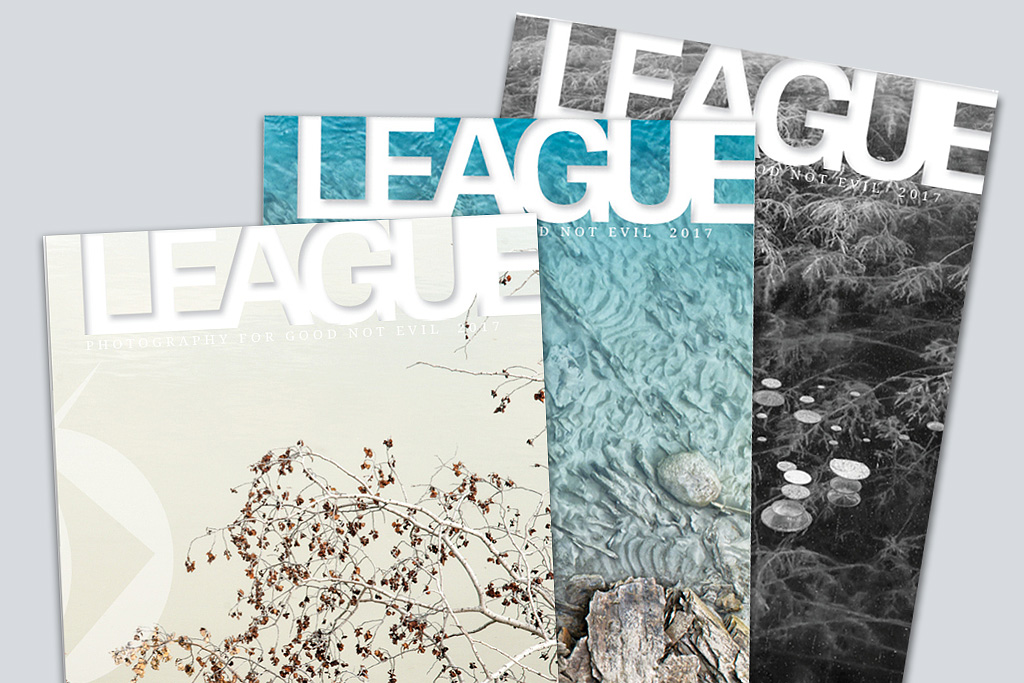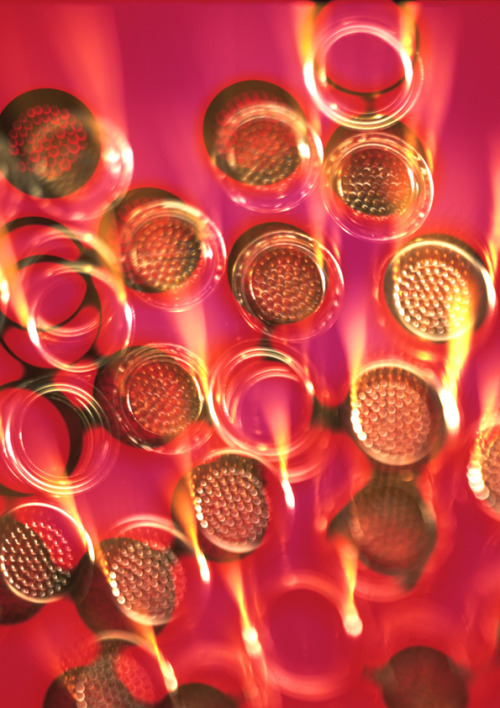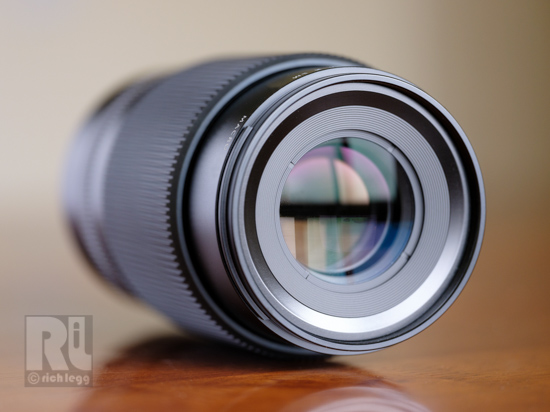Photographers

Non-flying Flying Squirrel
1x Blog-Photographers' .
. '
After years of watching squirrels perform all sorts of gymnastics to get to the bird feeders in our yard, I thought I would try to get a shot of one taking a big leap — for food, of course. Just had to figure out how to outwit my ingenious models.
For this shot, I first attached the branch you see in the picture to my kids' swing set, using two screws to
make sure the branch was securely fastened. I then set up a bird feeder tray on a freestanding pole opposite the swing set and screwed another branch into the tray. Once the branch was secure, I filled the tray with peanuts and birdseed.
Now that the stage was set, I searched for a good spot to set up my tripod and camera. I needed a position that would allow me to get both branches in focus at the same time while using manual focus. Once the camera and tripod were set, I hooked up my remote and left the camera on manual focus. Then I went into the house and waited for the squirrels to arrive. When they reached the end of the branch and looked like they were about to jump, I pressed the remote button. The squirrels froze when they heard the shutter noise, but that only lasted for a couple of seconds — peanuts are much more intriguing than shutter sounds.
After they made their jump, I attempted to get a shot of them landing on the bird feeder tray. I opened the door and walked toward them with the remote in my hand. They started getting nervous, so I knew they were likely to jump back to the first branch, giving me an opportunity to get a good shot of their return flight. I took about 900 shots, ending up with about five images that I thought were really nice. This one was my favorite.
I prefer to not photograph anything in bright sunlight, but I tried it on this day. As it turns out, all of those shots went straight into the trash can. Morning sunlight is ideal for taking these types of images, especially when there are some light clouds.
I used a Canon 1D X because I needed to shoot at 13 frames per second. Squirrels are speedy creatures, and jumping squirrels are even faster. I used a Vello FreeWave Plus Wireless Remote Shutter Release and a Gitzo tripod with an adjustable center column. I set the camera to Aperture Priority (AV) mode and an aperture of f/2.8 to get the speed I needed and to blur the background as much as possible.
"The squirrels froze when they heard the shutter noise, but that only lasted for a couple of seconds — peanuts are much more intriguing than shutter sounds."
Now that the stage was set, I searched for a good spot to set up my tripod and camera. I needed a position that would allow me to get both branches in focus at the same time while using manual focus. Once the camera and tripod were set, I hooked up my remote and left the camera on manual focus. Then I went into the house and waited for the squirrels to arrive. When they reached the end of the branch and looked like they were about to jump, I pressed the remote button. The squirrels froze when they heard the shutter noise, but that only lasted for a couple of seconds — peanuts are much more intriguing than shutter sounds.
"I took about 900 shots, ending up with about five images that I thought were really nice. This one was my favorite."
After they made their jump, I attempted to get a shot of them landing on the bird feeder tray. I opened the door and walked toward them with the remote in my hand. They started getting nervous, so I knew they were likely to jump back to the first branch, giving me an opportunity to get a good shot of their return flight. I took about 900 shots, ending up with about five images that I thought were really nice. This one was my favorite.
I prefer to not photograph anything in bright sunlight, but I tried it on this day. As it turns out, all of those shots went straight into the trash can. Morning sunlight is ideal for taking these types of images, especially when there are some light clouds.
I used a Canon 1D X because I needed to shoot at 13 frames per second. Squirrels are speedy creatures, and jumping squirrels are even faster. I used a Vello FreeWave Plus Wireless Remote Shutter Release and a Gitzo tripod with an adjustable center column. I set the camera to Aperture Priority (AV) mode and an aperture of f/2.8 to get the speed I needed and to blur the background as much as possible.
POST PROCESSING
I always shoot in RAW format since it gives you much more flexibility than JPEG. The post-processing of this image was done in Adobe Photoshop and Nik Color Efex Pro 4 plugin.
1) The first thing I usually do is sharpen my image in Photoshop. Some say you should only sharpen at the very end of post-processing, but it's my way of testing to see if the image is good enough. I use a sharpening action that I purchased from a website called Nature's Moments.
2) After running the action, I add a layer mask to the image that the action created. Then I paint away the areas that I don't want to sharpen. This leaves a cleaner image. You don't want to sharpen areas that are not in focus because this will increase the noise in those areas.
3) After sharpening the image, I opened the photo in Nik Color Efex Pro 4 plugin and applied the Brilliance/Warmth filter to add a little color to the overall image. You will notice that RAW images are a bit on the dull side, so this brings back some of the original color.
4) The background was a little too busy for my taste. Back in Photoshop, I used the Brush tool, set to 15% Opacity, and sampled green from the image. I usually select a green that is on the brighter side. Using a very soft Brush and painting lightly works much better than any blur filter I've found in Photoshop.
1) The first thing I usually do is sharpen my image in Photoshop. Some say you should only sharpen at the very end of post-processing, but it's my way of testing to see if the image is good enough. I use a sharpening action that I purchased from a website called Nature's Moments.
2) After running the action, I add a layer mask to the image that the action created. Then I paint away the areas that I don't want to sharpen. This leaves a cleaner image. You don't want to sharpen areas that are not in focus because this will increase the noise in those areas.
3) After sharpening the image, I opened the photo in Nik Color Efex Pro 4 plugin and applied the Brilliance/Warmth filter to add a little color to the overall image. You will notice that RAW images are a bit on the dull side, so this brings back some of the original color.
4) The background was a little too busy for my taste. Back in Photoshop, I used the Brush tool, set to 15% Opacity, and sampled green from the image. I usually select a green that is on the brighter side. Using a very soft Brush and painting lightly works much better than any blur filter I've found in Photoshop.
TIPS
1) To get the bird feeder tray off the ground, I used about five feet of PVC pipe and then attached the tray to the top of the pipe. Most squirrels had a problem getting up the slippery PVC, but some still managed to scramble up and reach the peanuts and birdseed. I have heard that if you attach a Slinky toy to the top of the PVC and let it hang all the way down to ground (with the PVC pipe inside the Slinky), the squirrels will have a really hard time getting up to the tray.
2) Please always put the squirrels' (and all animals, for that matter) safety and welfare first.
2) Please always put the squirrels' (and all animals, for that matter) safety and welfare first.
BIOGRAPHY
First and most importantly, I like to laugh. As for my photography, I am more serious. In fact, I work hard to produce the best photos possible. While I'm shooting, I always keep three things in mind: light, perspective and aperture. My principle is that if it's not good enough for me, I'll never show it to you.
I would like to be thought of as a well-rounded photographer and not pigeonholed as someone who only photographs macro subjects, or birds, etc. Sadly, one of the only genres that I am currently unable to shoot is landscape photography — there's nothing special about the scenery where I live, and I don't have the luxury of traveling.
I'm from Michigan in the US, and I was born in 1963. I started photography in 2000, and I'm not really sure what I did before I found this passion of mine. I have always had an appreciation for nature ever since I was a little kid, and I do not think that it will end anytime soon.
I would like to be thought of as a well-rounded photographer and not pigeonholed as someone who only photographs macro subjects, or birds, etc. Sadly, one of the only genres that I am currently unable to shoot is landscape photography — there's nothing special about the scenery where I live, and I don't have the luxury of traveling.
I'm from Michigan in the US, and I was born in 1963. I started photography in 2000, and I'm not really sure what I did before I found this passion of mine. I have always had an appreciation for nature ever since I was a little kid, and I do not think that it will end anytime soon.
























